"I mean, this guy had his knife between my ribs and I thought, 'Go on then. Are you going to push it in or aren't you?'"
David Barton, a professor in the English Department of the National Central University in Jhongli City (中壢), Taoyuan County is no ivory-tower academic. His life in Taiwan, he told me with a frankness that proved typical of him, has been characterized instead by encounters with brutality, alcohol and violence.
"I've sent one friend home in a box and seen another in a coma he still hasn't recovered from. Another's still in the hospital, and another broke both legs. I've had both arms broken myself. All of us were foreigners, and all these things were alcohol-related," Barton said.
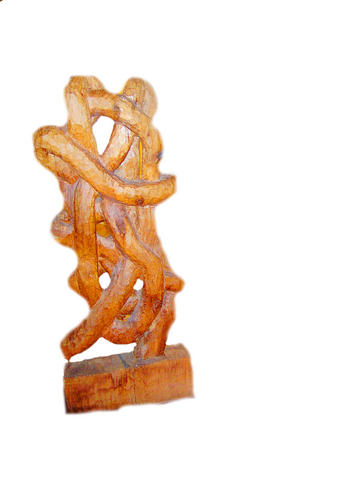
Barton's Rabelaisian novel Teaching Inghelish in Taiwan [reviewed the Taipei Times on Oct. 28, 2007] contains many wild fantasies, but his own experiences here seem to have been, if anything, even wilder.
"Taoyuan and Chungli used to be the center for all this foreigner craziness," he said. "There were three bars, Foxy 1, 2 and 3. They're closed now, but the area remains the armpit of Taiwan.
"We felt we were in some sort of industrial hell. We'd sit on the roof at dawn and watch the factories letting off effluent or long plumes of smoke over Taoyuan. It was as if we were in Ridley Scott's Blade Runner. Even if you went to what we called 'dead dog beach' at Yongan (永安) you couldn't escape the strong sense of Apocalypse Now.
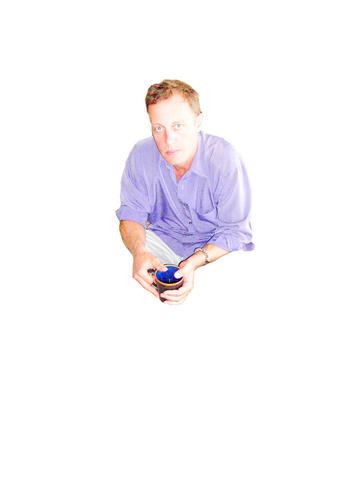
photos: Jay Chen
"Even so, we always looked down on the Taipei foreigners. They all thought they were so special, ugly guys with the most beautiful girls, kings in their own little kingdom. We felt we were the punk rockers on an island of Jimmy Buffett fans."
Barton has been living in Taiwan since 1994. He was brought up in Saskatoon in central Canada. He still has a cabin in the wilds of North Saskatchewan, he says, but he doesn't use it much nowadays.
Were the fights and the drinking a comment on Taiwan, I asked, or on the kind of foreigners it attracts?
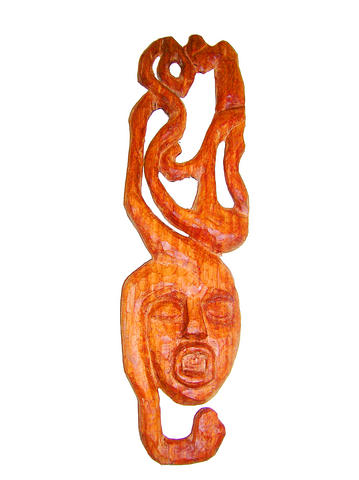
"They're a comment on how some foreigners react to Taiwan," he said. "They get knocked off their center by the place - by the constant availability of alcohol, for instance. And then the binglang [betel nut] girls - your construction-site worker or your English teacher drives home and sees them inside glass boxes in a filthy street. There'd be car crashes in Canada!
"I've seen bodies on the highway that have been simply left there, apparently as a safety message to other drivers. But at the same time they say you shouldn't look, because the ghost is lost and might leap into you through your eyeball.
"The bottle fights in this country are extraordinary. One Australian friend got 24 stitches across his face. An American I know started a fight because he told a Taiwanese who'd spat on the floor to clean it up. The guy had lost face so I knew a fight would erupt, and it did."
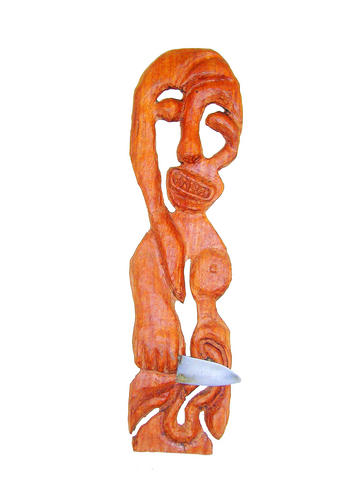
I found this strange as, in nine years here, I've never witnessed a single serious fight. But maybe it depends on where you lived, and who you drink with on a Saturday night.
I asked him how much of what he'd described was reflected in his students.
"Taiwan's university students don't seem to distinguish between cartoon and reality," he said. "This is the extended adolescence the poet Ottavio Paz thought afflicted Mexico. In North America the threshold between adolescence and adulthood has always been high school experiments with sex, drugs and rock 'n' roll. Then after high school you leave home. Somehow the parents in Taiwan won't let their children take on that responsibility, and it shows in the university. In 13 years teaching I can count the number of spontaneous questions I've been asked on one hand."
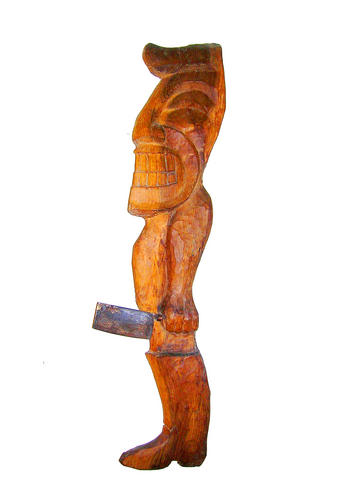
After reading Barton's earlier book, Pornography of the Emotions, Taiwan looked to me for a few hours like somewhere populated by the happily insane. It looks at Taiwanese filmmaker Tsai Ming-liang (蔡明亮), and Taiwanese artists Chen Chieh-jen (陳界仁) and Wong Chi-feng (翁基峰).
I asked him what the title of the book meant.
"It refers to the last moments of [Tsai's 2005 film] The Wayward Cloud (天邊一朵雲)," he replied. "The girl's watching the guy she loves performing pornography. She can't get him to love her, and she cracks. It takes the pornography to create the emotion.
I thought perhaps he was trying to shock me. If so, he succeeded with his next remark.
"Tsai Ming-liang is essentially a realist. His films show an aspect of Taiwan as it really is the surface reality, anyway. The Wayward Cloud actually makes me laugh."
The artist Chen, celebrated for his depictions of Imperial China's "death by 1,000 cuts" with his own head replacing that of the victim, was an expressionist because he offered representations of the Taiwanese unconscious, Barton said.
"He's looking for a way to break the Teflon skin of the Taiwanese. And the muteness in Chen's art is the same muteness I encounter in my students."
As for Wong, his raped and murdered Barbie dolls, Barton said, point to a nostalgia for childhood in a populace stranded in a wilderness somewhere between Japan and the US.
The book's chapters were originally papers given at conferences abroad. Barton doesn't feel he has the right to talk to his students about Taiwanese painters. Instead, he gives courses on Western Civilization from Dante to Wallace Stevens, on Paris in the 1920s, and on painting and jazz in 1950s New York.
"The artists in my book present an extremely alienated and violently schizophrenic Taiwan," he said. In the exaggerated emotional states that resulted, however, there was something absurd, and even funny.
"Not all Taiwan's ugly," he added. "I couldn't believe how lovely Tainan was, and the East Coast. Taichung's easy to live in, and it gets more laid back the further south you go. I don't want to scag Taiwan, just to highlight its Gothic qualities.
"But I've been in too many emergency rooms watching people getting stitched up, and had too many people knock me across chairs. It sounds like William Burroughs, I know. As a writer, I've been influenced by Burroughs - and by Antonin Artaud, sitting there in his insane asylum. I'm currently helping a translator in Vancouver with the first-ever Chinese translation of Burroughs' The Naked Lunch.
Barton is, rather unexpectedly, also a wood-carver. He carves cedar, camphor, soapstone and alabaster. He's influenced by the traditional art of Canada's West Coast, he says. He scarred his hand carving one piece. He doesn't try to sell his work, but instead leaves them "standing around the place."
Even so, it's Taiwan rather than Canada that retains his interest nowadays, or so his books seem to imply.
"Taiwan?" he said as we parted. "Ah yes, this happy prison that holds us all!"

Behind a car repair business on a nondescript Thai street are the cherished pets of a rising TikTok animal influencer: two lions and a 200-kilogram lion-tiger hybrid called “Big George.” Lion ownership is legal in Thailand, and Tharnuwarht Plengkemratch is an enthusiastic advocate, posting updates on his feline companions to nearly three million followers. “They’re playful and affectionate, just like dogs or cats,” he said from inside their cage complex at his home in the northern city of Chiang Mai. Thailand’s captive lion population has exploded in recent years, with nearly 500 registered in zoos, breeding farms, petting cafes and homes. Experts warn the

No one saw it coming. Everyone — including the Chinese Nationalist Party (KMT) — expected at least some of the recall campaigns against 24 of its lawmakers and Hsinchu Mayor Ann Kao (高虹安) to succeed. Underground gamblers reportedly expected between five and eight lawmakers to lose their jobs. All of this analysis made sense, but contained a fatal flaw. The record of the recall campaigns, the collapse of the KMT-led recalls, and polling data all pointed to enthusiastic high turnout in support of the recall campaigns, and that those against the recalls were unenthusiastic and far less likely to vote. That

The unexpected collapse of the recall campaigns is being viewed through many lenses, most of them skewed and self-absorbed. The international media unsurprisingly focuses on what they perceive as the message that Taiwanese voters were sending in the failure of the mass recall, especially to China, the US and to friendly Western nations. This made some sense prior to early last month. One of the main arguments used by recall campaigners for recalling Chinese Nationalist Party (KMT) lawmakers was that they were too pro-China, and by extension not to be trusted with defending the nation. Also by extension, that argument could be

Aug. 4 to Aug. 10 When Coca-Cola finally pushed its way into Taiwan’s market in 1968, it allegedly vowed to wipe out its major domestic rival Hey Song within five years. But Hey Song, which began as a manual operation in a family cow shed in 1925, had proven its resilience, surviving numerous setbacks — including the loss of autonomy and nearly all its assets due to the Japanese colonial government’s wartime economic policy. By the 1960s, Hey Song had risen to the top of Taiwan’s beverage industry. This success was driven not only by president Chang Wen-chi’s